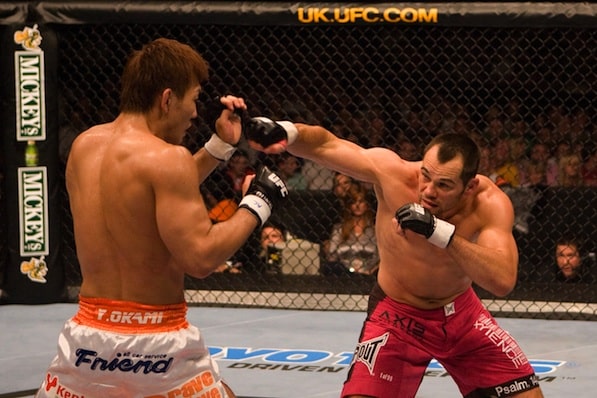Christy King ran the bandwidth test for a third time, receiving the same result. Hours before MMA fighters Rich Franklin and Yushin Okami were schedule to face off in UFC 72 in Belfast, Northern Ireland, King was facing her own opponent, the Odyssey Arena’s connection speeds, which were so slow it would take up to 24 hours to upload 30 seconds of video. With millions of expectant viewers around the world awaiting the bout, King was forced to take drastic measures. Scrounging up every euro she could find from staff on site, King caught a ride to the nearest Internet café, bought it out for the night, and converted it to a makeshift transmission studio. When the last notch on her computer’s progress bar finally filled, completing the upload of the night’s fight, it was six o’clock the next morning.
“The first five years I worked here, that was constant,” King recalls of her early days with the UFC. “I was always thinking on my feet to solve some crazy problem.”
If King were an MMA fighter, her nickname would be The Enabler. Though the nameplate on her office reads VP of Digital, Technology Research & Development, her role is a bit more amorphous. Some days “interpreter” is more appropriate, and, on others, scientist or developer. But whether she’s delivering content to a global audience or improving in-house operations, King is constantly doing one thing: helping to make possible the unprecedented surge in worldwide popularity that has defined the UFC’s short but dynamic history.
When King came aboard the UFC, there was no user’s manual or standard for IT logistics. Situations like the one in Belfast inspire King to deliver—and she does, consistently, every six months—something of a technology “haymaker,” a game-changing strike that can ultimately lead to victory. “We’ve been able to improve the layers of technology behind our processes so that we have a plan B and almost always a plan C,” she says.
One such haymaker is a media-management system that is a key driver behind the UFC’s global distribution efforts, a project King recently finished researching and implementing. With the system, personnel on any of the four continents where the UFC’s content is distributed have immediate access to the UFC’s media, be it a reporter searching for 30 seconds of b-roll footage or a webmaster from FX seeking fight highlights and stats to promote the next season of The Ultimate Fighter. All of this media, and often the associated metadata—those additional layers of information such as subtitles, sponsor logos, and overlay graphics—are being constantly organized for painless search and retrieval. To complicate things further, King’s department must prepare the content so that it is compatible with any of 200-plus formats.

“MMA is a worldwide sport,” King says, “because everybody understands it when they look at it. We have to be able to provide our content on anything and everything in the world people are using to view it—and none of that technology is stopping or slowing down anytime soon. My goal is to have a fight look and sound as good on a phone as it does on a 42-inch TV with speakers on the side.”
It’s a full-time job that has King acting as the interpreter for three languages. “I’m translating from marketing to computer nerd to executive,” she says. Similar to the way bios, captions, and other text data need to be tailored so that video editors in Brazil can busy themselves with transitions, rather than translations, King must ensure that the creative minds cutting together highlights aren’t hindered by coding complications. “Everyone has jargon and assumptions for their area of specialization,” she says. “It’s my job to make everything relative to our ultimate goal: the finished product.”
28
Languages UFC fights are broadcast in
145
Countries where UFC fights are broadcast
200+
Broadcast Video formats used to distribute content
14
Members on the technology team
Growing up with a father who designed computer hardware and an artist for a mother, King jokes that she was born to translate between minds that see the world very differently. Fortunately, King hasn’t had to whip into shape the UFC executive team—a fact that makes the organization more nimble and productive than some of its bigger contemporaries. “Our executives do not run this company by committee,” she says. “They hire the best and trust their employees to deliver the best.”
In her role, King is constantly revising and reimagining the best way to do the most common things. For all the progress she has made in bringing distribution up to speed technologically, there are never-ceasing opportunities for improvement. “We replace hardware about as fast as people are inventing it,” she explains. “What we did six months ago is very different from what we do today. When I say technology is changing every five minutes, it really is.” Something as simple as the freedom to adapt to those changes is a luxury that King and her team enjoy, and it allows them to innovate.
The UFC relies on a team of 260 employees across the globe to maintain the reputation of the world’s biggest MMA promoter. At all times, and from all locations, these people must be able to communicate and collaborate, and they can’t be impeded by time-wasting tasks or protocols. All the rote tasks that can bog down a business day—from seeking approvals to populating a spreadsheet—are a constant assault on productivity and efficiency, which King must counter with solutions that pack a punch.
After spending a year listening to managers from the UFC’s various departments bemoan the “pain points” in their department’s daily work, King compiled a list of objectives for improving those workflows. It was apparent that the answers she sought couldn’t be found on software from an electronics store, but rather required serious tailoring. “We are building this system from scratch to handle the rote tasks,” King says. “The idea is to free up more precious time to allow humans to utilize their higher thinking to solve the more nuanced problems.”
The resultant system, Cervello—the Italian word for brain—is a communications heavyweight, and is a serious effort to understand every UFC worker’s daily workflow and to automate as many repetitive tasks as technology will allow. Communication among the entire staff—a third of whom are constantly traveling—and the 400-plus fighters the UFC currently has under contract is a constant battle. It is an almost herculean task to keep constantly changing details organized, and, like every other company, the UFC has to figure out how to scale what they do well in order to keep growing.
The effects of this can be seen in everything, down to the flight reservations of the UFC’s fighters. Cervello now houses all the booking information for automatic input, by any appropriate UFC employee, from anywhere in the world. “The other important factor is that it’s not a free-for-all of information,” King says. “It’s organized so that information is safe and not extraneous for people who don’t need it.”
Currently, King is working on a process by which the software would automatically identify and send the appropriate medical documents to the 24 fighters on each event lineup, or “fight card,” based on each state or country’s commission rules. “We started this process with a goal of eliminating as many spreadsheets from the universe as possible,” King says with a laugh. “We’re not there yet, but we’re chipping away.”
Like the human brain, Cervello’s potential is not capped, which is a good thing for the UFC. With an ever-increasing pool of talent, as-of-yet-untapped markets in the United States and abroad, and—in King’s “Octagon,” so to speak—a relentless pursuit toward efficiency, Cervello will need to be as ambitious as its creators.

